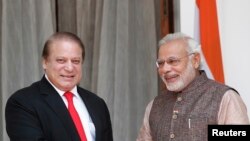WASHINGTON —
Narendra Modi’s Bharatiya Janata Party (BJP) won a historic election in India. His party soundly defeated the Congress Party and Modi assumes the leadership of India with a very strong mandate not seen in decades.
Modi’s campaign was largely focused on domestic issues and analysts say his views on foreign policy remain unclear – especially with regard to Afghanistan and Pakistan.
Michael Kugelman, is a senior program associate for South and Southeast Asia at the Wilson Center in Washington DC.
“Narendra Modi’s foreign policy interests in South Asia as they apply to India, Pakistan and Afghanistan are very unclear because on the one hand, he is very intense I believe on strengthening economic relations with not only these countries, but other countries as well which is all good, but the problem is Modi is a nationalist," he said.
Kugelman says Modi is pro-trade which could bring stability to the region. But he says Modi’s hardline views on Pakistan could come into play if a terrorist attack was to happen in India and its roots traced into Pakistan. Modi might not show the type of restraint as his predecessor.
Omar Samad, a senior fellow at the New America Foundation in Washington DC says Modi will likely temper the strong rhetoric he voiced on the campaign trail.
“What we do know is that his rhetoric during campaign was viewed as somewhat strong vis-à-vis terrorism and any external threat to India. But at the same time he balanced it with a moderate view in terms of economic cooperation and expanded relations with the region,” Samad said.
India and Afghanistan
India and Afghanistan have strategic partnership and so does Afghanistan and Pakistan, but Pakistan is concerned with India’s growing influence in Afghanistan which it sees as a threat to its national security.
Pakistani expert, Mansoor Ijaz says if Modi can improve relations with Pakistan, India could gain influence in Afghanistan.
“Basically, he will try to change the equation with Pakistan and if he has better relations with Pakistan then he can safely increase his presence in Afghanistan on the development side if he can assure Pakistanis that Pakistan is not being sandwiched between Afghanistan and India,” he said.
Ijaz added that “In my opinion Pakistan is more paranoid about the Indian presence in Afghanistan than the real threat.”
The view from Kabul
Both front runners in the Afghan elections, Ashraf Ghani Ahmadzai and Abdullah Abdullah have stated their goal to have good relations with both Pakistan and India.
Ghafoor Liwal, Director of the Afghan Regional Studies Center in Kabul believes that future Afghan government will continue its warm relations with India. On Pakistan, Liwal is pessimistic.
“Pakistan’s biggest hope is that the future Afghan government fails to bring security and stability to Afghanistan and the country will to some extent attempt to fuel insurgency and armed rebellion against the government,” Liwal said.
Modi’s campaign was largely focused on domestic issues and analysts say his views on foreign policy remain unclear – especially with regard to Afghanistan and Pakistan.
Michael Kugelman, is a senior program associate for South and Southeast Asia at the Wilson Center in Washington DC.
“Narendra Modi’s foreign policy interests in South Asia as they apply to India, Pakistan and Afghanistan are very unclear because on the one hand, he is very intense I believe on strengthening economic relations with not only these countries, but other countries as well which is all good, but the problem is Modi is a nationalist," he said.
Kugelman says Modi is pro-trade which could bring stability to the region. But he says Modi’s hardline views on Pakistan could come into play if a terrorist attack was to happen in India and its roots traced into Pakistan. Modi might not show the type of restraint as his predecessor.
Omar Samad, a senior fellow at the New America Foundation in Washington DC says Modi will likely temper the strong rhetoric he voiced on the campaign trail.
“What we do know is that his rhetoric during campaign was viewed as somewhat strong vis-à-vis terrorism and any external threat to India. But at the same time he balanced it with a moderate view in terms of economic cooperation and expanded relations with the region,” Samad said.
India and Afghanistan
India and Afghanistan have strategic partnership and so does Afghanistan and Pakistan, but Pakistan is concerned with India’s growing influence in Afghanistan which it sees as a threat to its national security.
Pakistani expert, Mansoor Ijaz says if Modi can improve relations with Pakistan, India could gain influence in Afghanistan.
“Basically, he will try to change the equation with Pakistan and if he has better relations with Pakistan then he can safely increase his presence in Afghanistan on the development side if he can assure Pakistanis that Pakistan is not being sandwiched between Afghanistan and India,” he said.
Ijaz added that “In my opinion Pakistan is more paranoid about the Indian presence in Afghanistan than the real threat.”
The view from Kabul
Both front runners in the Afghan elections, Ashraf Ghani Ahmadzai and Abdullah Abdullah have stated their goal to have good relations with both Pakistan and India.
Ghafoor Liwal, Director of the Afghan Regional Studies Center in Kabul believes that future Afghan government will continue its warm relations with India. On Pakistan, Liwal is pessimistic.
“Pakistan’s biggest hope is that the future Afghan government fails to bring security and stability to Afghanistan and the country will to some extent attempt to fuel insurgency and armed rebellion against the government,” Liwal said.




